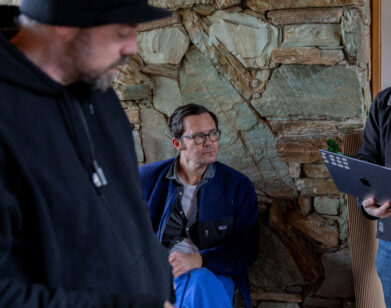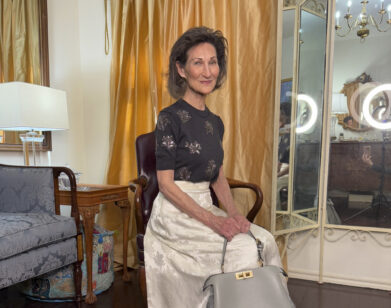The Web Nico Muhly Weaves
ABOVE: NICO MUHLY. PHOTOS BY BENJAMIN STELLY
When we first encounter composer Nico Muhly in the green room at the offices of WNYC, where he’s just done a radio interview, he asks if we can hold off for a moment while he answers an email. Afterward, he looks up and explains, with a laugh, that his mom wants him to send her $400 over the Internet.
It’s a normal enough request in this day and age, but the context in which we meet Muhly—to discuss his new opera now playing at the Met, Two Boys—lends it a certain funny sense of portent. Two Boys, possibly the first major cyber-era opera, is a story of Internet fraud (though of the romantic, not financial, variety); set in 2001, it’s based on a real, unbelievable case that took place in Manchester, England, a decade ago, in which a young teenager employed a variety of online personae to manipulate a slightly older boy into murdering him.
That’s not a spoiler—the stabbing happens in the first scene of the opera. It’s the bizarre, twisting way these two young characters arrive at it, and the trouble that Luddite police detective Anne Strawson has wrapping her head around their motivations, that make up the meat of its story. (Playwright Craig Lucas wrote the spare, elegant libretto.) “That’s where it gets interesting,” as the animated, excitable Muhly himself might say—and does, several times throughout our conversation, about all kinds of things. For Nico Muhly, there’s potential for drama in nearly everything.
ALEXANDRIA SYMONDS: When you set a story in the very recent past, it brings to light all the ways that life unexpectedly changes in the space of a dozen years. Anne, the detective character—you can’t imagine a middle-aged person like that anymore, even now.
NICO MUHLY: You can’t, although it’s interesting. We can’t, and yet those people totally exist. People’s ability to be fooled on the Internet has not gone away. I was so happy when that Manti Te’o stuff happened, because I was like, I know, right?
SYMONDS: Well, and you talked to Nev Schulman from Catfish, right? For the Wall Street Journal.
MUHLY: Yeah! This exists. Back in 2001, there wasn’t Facebook. There was kind of MySpace stuff, but someone’s picture turned up next to their discourse, and that was the only thing you had. The amount of profile information you could have, in an instant message thing, was like three lines of text. There was a much greater opportunity for vagueness. I think now we’re trained to be able to see someone who’s totally fake. You can see an email, without even reading it, just the way it’s spaced, that it’s fake. Back then, not so much.
SYMONDS: I think in less than two decades, our collective conscious idea of the Internet has changed so much, in terms of how we conceive of it. In the mid- to late ’90s, it was an object, a tool, you’d use and then be done. Around the time the opera takes place, 2001, I think people thought of the Internet as a location, a place where you could go to hang out. Now I almost feel like, because it’s so pervasive, we almost think of it in terms of wave logic rather than particle logic. It’s just this entity that’s seeping into us all the time.
MUHLY: There’s an osmotic thing between us and it that’s much more active than it used to be. Also, in 2001 you still had to go on to it.
SYMONDS: Exactly.
MUHLY: People had a dedicated line for it. It was an on or off situation. There was no mobile way to access it. As you say, now it’s everywhere. Before, you needed to connect with a cable to it.
SYMONDS: I wanted to talk to you about how you conceived of the sonic texture of the Internet. It’s stupid of me, but I think it’s probably a common impulse—I came in expecting to hear…
MUHLY: Electronic sounds. Like Tron. The reason I avoided electronics was because those sounds read as outdated so much faster, even, than an idea. [laughs] And the other thing for me is that if you leave it vague, each listener can sort of inscribe herself into it; whereas if it sounds like this computer… [makes computer sounds] If it sounds like R2D2, I’m telling you already what you think it sounds like.
It was a poetic transcription of what it sounded like, so you never hear a modem noise, you never hear any of that stuff. Instead, whenever the chatrooms come up, you get this orchestral flourish, or the multiple voices, or the five million ways you can manipulate orchestral instruments into sounding somewhat strange. All these things are simultaneously in play, mainly to avoid having to be really specific, because that’s where you get into trouble in five years.
SYMONDS: I think that the way that it’s orchestrated works beautifully, probably much better than if you used dialup noises.
MUHLY: I think so. For me the best example of a “Let’s talk about what it’s like when there are two worlds” movie is Labyrinth; David Bowie has this whole synthesizer universe. But that’s so ’80s. That could not take place at any other time. [laughs]
SYMONDS: I’m interested, in general, in the way that any era views the future as being indicative of the values of that era. Obviously a very literal modem noise would sound outdated, but there are electronic musicians now who are making music that sounds, to me, very futuristic. This is an easy example to pick out, but when you hear Grimes, when you’re like, “Wow! She’s from the 30th century.”
MUHLY: From the future, yeah, right.
SYMONDS: Are any artists from the past whose work still feels very futuristic to you, or whose idea of the future you think is still valid?
MUHLY: In the world of not-electronic music, still, to me, nothing sounds more modern than the beginning of Music for 18 Musicians, the Steve Reich piece; or even Music in 12 Parts, the Phillip Glass piece, feels incredibly from the future. I think Björk’s first three discs still sound—they don’t sound dated. Those albums, I think, people are still playing catch-up with that stuff.
I think, also, there are kids—people who are in their late teens—that have a faster fluency with sample-based things. If you look at that band Disclosure, those two boys from England, it’s like they throw this in, throw this in, throw this in, really simple bass sound, go. Minimal. It’s less future-looking, and more weird jumps. For instance, Yeezus sounds so much like the Nine Inch Nails I was listening to in 1992.
SYMONDS: Yeah, I was going to bring Trent Reznor up as someone who makes music that still feels futuristic.
MUHLY: Nine Inch Nails, I think, was always ahead. Swans. In general, the music that’s sounded much more futuristic has tended to be darker. Like the Björk song “Pluto”—darkest, right? I really feel like young artists who are hard-edged have still not quite caught up with that yet, 15 years later, or 20 years later.
SYMONDS: What interested you about this case in particular, that you based the opera on? I feel like there are so many of these, we hear about them pretty often, but maybe that wasn’t the case in ’01.
MUHLY: It was one of the first ones that I read about, and it was one of the first ones where I felt like there was something more to it that wasn’t being [explored]. Hoaxes—I’ll include this case in the world of hoaxes—either have a point, or they don’t have a point. So money hoaxes are pretty straightforward. Emotional abuse hoaxes are really straightforward, where it’s like: “I just want to make you feel shitty about yourself, make you gag, get upset.”
Romantic hoaxes, Catfish is an interesting example, and that is semi-directional. It has movement, but it doesn’t have a goal. And this was interesting because it had movement, not really a goal, and then a really unexpected left turn with this fake suicide, or real—whatever it was. There was a masochism to it, there was a loneliness to it, there was a sense of itinerary without a destination. All of which, to me was very poetic. It wasn’t as simple as, “Oh, I just wanted to hear someone say that they love me,” or, ” I just want $500.” And I think most of life can boil down to, “I want someone to say ‘I love you'” or “I want $500.” [laughs]
SYMONDS: [laughs] And you can never have both at the same time.
MUHLY: Right? So this was exciting for that reason. Also, just because I felt contemporary with the people involved, and I sort of got it. I find teen-girl bullying to be somewhat alien. I know that this is a thing, and I obsessively read those chat transcripts, but that is something I empathize with but don’t understand the mechanisms for. But [this] semi-gay, 14-year-old problem—that I get. So there is that.
The other thing that interested me about this was that the hinge of the case is this spelling mistake; and the way that this woman figures this out—and this is also what happened in real life—is there was a shared misspelling, which for me is the most erotic piece of information ever. I love that kind of stuff. Then, when you realize that all these invented characters had different fonts, different spelling conventions, different punctuation conventions, you’re like, “All right, someone was a composer.” This little kid was a composer.
SYMONDS: Yeah, that’s interesting.
MUHLY: And is essentially imitating the tasks that bel canto opera composers went through. How do you differentiate the music for the bass baritone, how do you differentiate the music for the heroine? You’re writing a mini little booklet of sexist tropes. [laughs] With orchestra.
SYMONDS: I guess it’s hard, at 14, to think in subtleties.
MUHLY: It’s hard at 14, it’s hard at 45! And that’s where it gets interesting, when you realize that stock characters, when they come from the same compositional voice, they all bear the stench of the author. There are some people whose cologne you never quite forget. That what was so exciting about this—I say exciting in every sense of the word. It was horrifying. But it felt like the most operatic possibility.
Honestly, I feel like we still haven’t heard enough about the Manti Te’o case. I really want to know. I feel like, there are all these missing dates. If you look at it—I made a little chart in my house—okay, he went to San Diego, who the fuck did he see? Who did he see?! Where did he go? And how much did his dad know? It’s extra crazy to me, too, because they spoke on the phone. Those voicemails are my everything. If I can get the rights to those voicemails, I’m going to make a remix. When she’s like, “How are you going to do me that way, who is that girl?” It’s so great. [laughs] It was so good. Then you’re like, whoa, I need to know everything there is to know about Samoans. [laughs]
SYMONDS: [laughs] It’s so easy to get into those K-holes.
MUHLY: I went into a Samoan sexual politics K-hole for like three weeks. My boyfriend had to call the doctor. [laughs] He was like, “Are you in there reading about Samoans again?” I’m like, “Shhhhh!.” [laughs] I was, like, booking tickets. I just need to know.
SYMONDS: One of the things I think really lends to the tragedy of this story is that at that time, there was this idea that the Internet was just something to play around with. Everything was happening virtually; we didn’t think of actual power. And this kid, he’s so young and discovers he does have power, and it’s dangerous. I think we’ve all been 13 and felt like, “My crush doesn’t like me—I want to kill myself!” But having mitigating factors between yourself and direct access to being able to act, powerfully, on that emotion…
MUHLY: And compel people to do stuff. Right.
SYMONDS: Is what keeps any of us living to 14.
MUHLY: Yeah, it’s a flexing of a muscle that you didn’t really realize you had. But again, you find yourself having the ability to enjoy a certain power, as you say, online that you wouldn’t necessarily have in person. Part of growing up is figuring out how you are going to distribute that between offline and online. What I loved about this story was it was just two people talking in the north of England and they created something online that was so volatile that it spilled out, with a knife, into actual space.
SYMONDS: Yeah, absolutely. I’ve read some other interviews that you’ve done about this piece, and you’ve talked about how the “masked ball” is a traditional operatic structure, and the Internet is just the biggest masked ball. I almost feel like it requires much less suspension of disbelief to understand this story.
MUHLY: Yeah, me too. It’s funny, I always talk about Così [fan tutte] because in Così, you are really meant to think that these sisters’ fiancés come back to them wearing Halloween-store mustaches and they’re like, “Who dat?” [laughs]
It’s so crazy, but on the Internet, it happens all the time. It’s not weird. It’s standard. It’s part of the way that we live. If you know people with kids, it’s part of what they have to teach their kids now. Even though the kids are so much better technologically then they are. And that’s what’s even crazier. My friends who are my age, in their 30s, who are just starting to have kids, the kids aren’t quite old enough yet to do it. But I have a friend who is a total—like if you asked him to take a photo, with his iPhone, he would never be able to do it. But, his son is like, boppity-bop-bop-bop, sending shit all around. He doesn’t know what it means, but there’s a facility. We’re all going to be outdated.
SYMONDS: Right, and kids catch onto the technology much more quickly than they’re able to develop the emotional tools to deal with it.
MUHLY: I saw a little girl on a plane, holding her mom’s book, trying to turn the page like it was an iPad.
SYMONDS: Oh, that’s so sad! That kills me.
MUHLY: I was like, “Girl, you’re on JetBlue!” [laughs]
SYMONDS: Weirdly, though, I kind of feel like there’s almost been a cleaning-up of the Internet, as technology has developed.
MUHLY: Oh yeah, it’s much less scary than it used to be.
SYMONDS: Myspace was literally situated on a black screen; it was this weird kind of grotto. It felt damp.
MUHLY: Yeah, like a back room.
SYMONDS: And Facebook feels like a warm, clean towel by comparison. I think that’s true with a lot of things too, especially chatrooms. Text-based chatrooms kind of fell out of favor. No one really does that anymore.
MUHLY: If you want to see some dark places of the Internet, unmoderated comment threads—I’m not talking about 4Chan, but about specific issues. That’s where it gets really interesting. There’s been an argument for 20 years about if transgendered women should go to the Michigan Women’s Music Festival. The comments about that issue are unreal. The directions and the side things and the accusations and the IP address look-ups, it’s really amazing. You get the sense that in a lot of cases, it’s happening in absolutely unchecked and unfiltered thought. It’s just being typed and put out there. That is something that we haven’t lost. I was scared that rules of usage would mean that you would stop being able to see people really lose it. When people lose it, that’s when you actually hear what’s going on. For me, when I’m writing someone an email, I try to think about it. But when I’m facing you, you just want to say the thing that comes to mind.
So there’s that, or there’s, the fat acceptance movement is unbelievable. The fat acceptance movement as it relates to racism is unbelievable. It’s an unbelievable space because it’s, like, 55 levels down from what would be a very well-thought-about Jezebel post by Lindy West, where you’re like, that’s great, “I love this, it seems so rational, let’s all talk about it.” But [here] you just go through the door in the basement and it’s like, “What?” It’s an amazing thing. It’s an amazing way to relate to text. It’s an amazing way to relate to people.
SYMONDS: I thought a lot after seeing the opera about this weird tangent that David Foster Wallace goes off on in Infinite Jest about videophones—that when you’re having a conversation on the phone or online, you can also be clipping your nails or eating an apple or whatever.
MUHLY: Or peeing.
SYMONDS: Yes, let’s hope not.
MUHLY: I confess, I’m in a perpetual state of doing that.
SYMONDS: Really?
MUHLY: Yeah, because when else do I get to pee? [laughs]
SYMONDS: [laughs] But anyway, the idea being, that when you’re in a video call with someone, you have to be completely present, otherwise you offend them; and then people start buying these masks in order to look more attractive on their video calls, and eventually people just give up on it altogether. Sometimes you don’t want total access; you want to hold back, and that’s also very much a convention of presented narrative. Hitchcock says that what’s more interesting is what you leave off the screen.
MUHLY: Yeah, right.
SYMONDS: And in your opera, we don’t see or even have access to this sex act that happens. We get right up to it, and then he stumbles across the stage to tell the story instead.
MUHLY: Interesting. Right. I think that it’s definitely the case that now, if someone doesn’t have Facebook, you’re like, “Oooh.” [laughs] Or people whose digital footprint is mysterious. It registers in a different way than most people. People who have a completely legible digital presence, I’m like, that’s great, awesome. But then if there’s anything shrouded, anything veiled, you just file it under: “interesting, intriguing.” As it relates to interpersonal stuff in the real world, it’s interesting that you should say that, because I would never, ever, ever Skype anyone. I fucking hate it. It’s so close to being real, but it’s not.
SYMONDS: Right, uncanny valley.
MUHLY: It’s like watching those Pixar movies in 3D: every object is in focus, but that’s not what stuff looks like. I don’t want to see every blade of grass. I want it to be a weird squinty grass area. And sometimes the reality of people’s domestic spacing is othering to me. [laughs] It could be generational, is the other thing. I had a friend who is 21 years old and he came to stay with me for a couple nights from England, and he did the weirdest thing, which is apparently a thing that people do. He got on Skype with his girlfriend, who was in London, and he just left the motherfucker on while we were wandering around, brushing our teeth. I was like, “What is this random girl doing in my house?” It was really strange, but he was like, “We do it all the time.” They weren’t even talking to each other, but she was wandering her room, and the video connection was open. At first I was really uncomfortable with it and I was like, “Is this how it is now? Is this what we’re doing?” But who knows! Maybe what, to us, felt like, “Put a veil on, girl,” for their generation, that was a way to show a presence.
SYMONDS: Yeah, that’s crazy.
MUHLY: Isn’t that crazy? But he wasn’t like, “Oh, we do this weird thing.” He looked at me like I was crazy. But it’s interesting, when you talk about having access but you don’t have access to them in reference to the sex act. If we did have access to it, we’d be less interested in it.
SYMONDS: Oh, totally, exactly.
MUHLY: I think people are finding new ways to be cagey, and maybe if you’re on Skype with your girlfriend from 2,000 miles away, what you do right behind the door is it, or what happens right before you pick up. There are ways to stage constant openness in even more deceiving way.
One of my favorite things that has ever happened was a couple years ago: I was on Sixth Avenue and 18th Street, and there was this guy in the middle of the afternoon rush; it was 5:30, so everyone’s walking home. There’s was this guy and he was like, “Oh yeah, babe, I’ll be right there, I’m on Seventh and 23rd,” and this woman next to him goes, “No, you ain’t!” [laughs] Just right into his phone. It was so good. He didn’t know what was going on. His suit was so ill tailored.
SYMONDS: That’s amazing. I love that.
MUHLY: I’ve actually had it once where I saw a guy be like, “Yeah, baby,” whatever, it was a total lie and he just looked at me like that [smiles and winks]. And I was like, “Whoa, that was intimate.” [laughs] Then I felt really implicated! I was like, I should call Heather and tell her, her man looked at me.
TWO BOYS IS NOW PLAYING AT THE METROPOLITAN OPERA. FOR TICKETS OR MORE INFORMATION, PLEASE VISIT THE MET’S WEBSITE.







